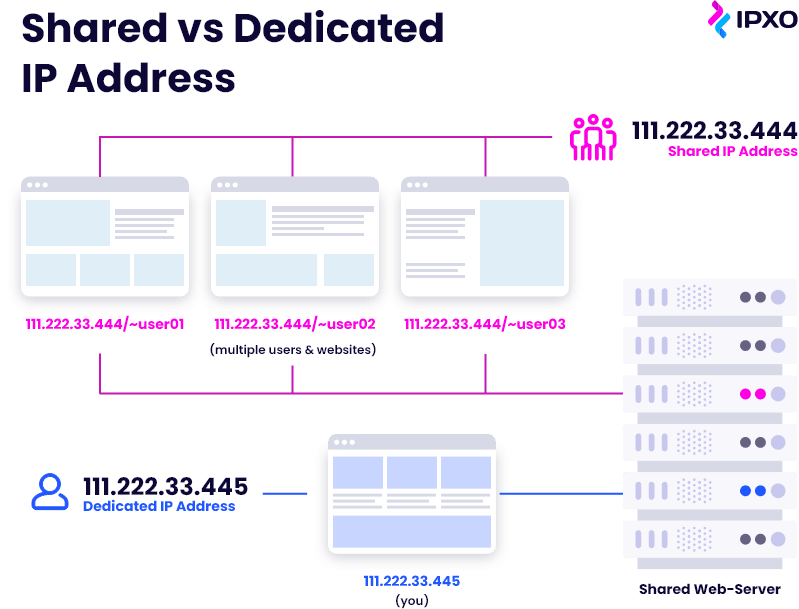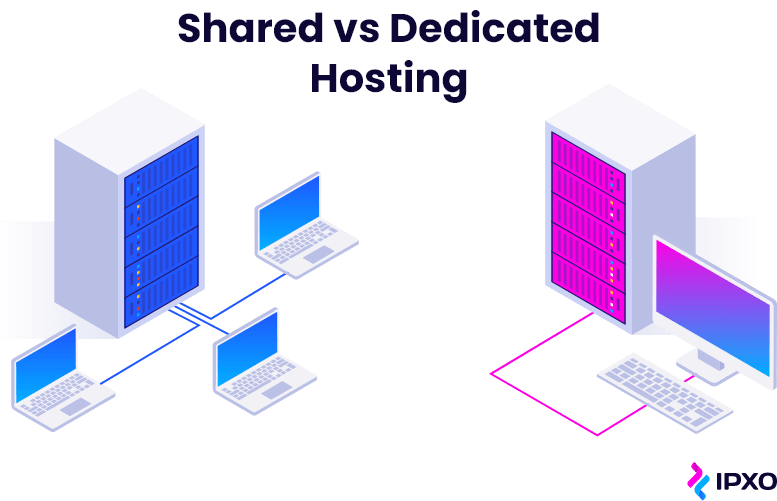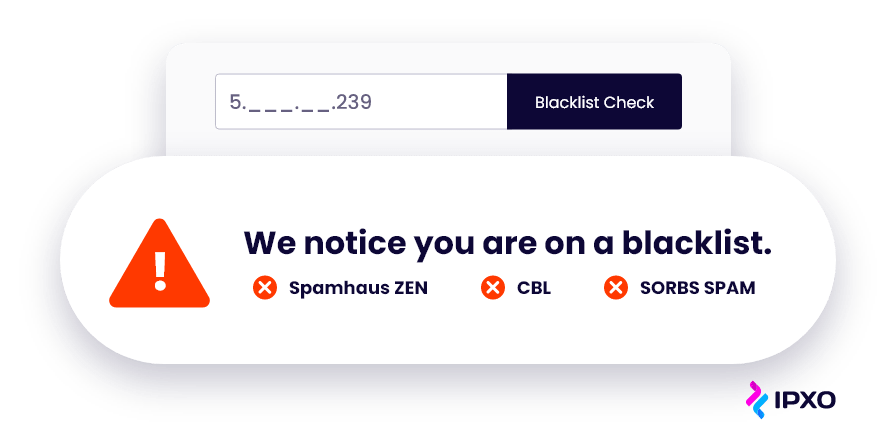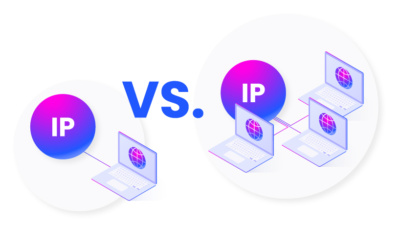What Is a Dedicated IP Address? A Comprehensive Guide
Learn all about dedicated IP addresses and who should consider using them.

A dedicated IP address is a type of IP address that is assigned to a single domain. Dedicated IP addresses exist in opposition to shared IPs, which are shared among two or more domains.
IP stands for Internet Protocol, and the Internet Protocol address (IP address) is a unique numeric or alphanumeric identifier. A common use for IP addresses is identifying the server on which a website is hosted.
A dedicated IP address is literally dedicated to one website. If your domain has a dedicated IP address, that address is unique to your domain. Entering a dedicated IP address into your browser’s address bar will call up the assigned website. Just like entering a URL would.

Not all domains need dedicated IP addresses. However, if you want to benefit from increased server control, greater security and better IP reputation, you may consider opting for a dedicated IP address.
Below, you can find more information about the differences between shared IP addresses and dedicated IP addresses. You can also learn about the advantages that using a dedicated IP address for your website could bring.
How is a dedicated IP address different from a shared IP address?
The majority of domains on the internet use shared IP addresses. This simply means that, while the domains are unique, the same IP address that identifies them is shared with other domains.
From a hosting provider’s perspective, it’s usually inefficient to assign a dedicated IP to each domain they’re hosting. That’s because most websites can function perfectly well with shared hosting and a shared IP address. We’re already dealing with IP address exhaustion, and it makes sense to group multiple domains under the same IP address.
The distinction between a shared IP address and a dedicated IP address is similar to that between shared hosting and dedicated hosting.
With shared hosting, your hosting provider leases space on a shared server. Many users share the same server, often with a shared IP address, which keeps hosting affordable for all.
If you need full control and have a few dollars to spare, you may opt for dedicated hosting. With dedicated hosting, only you and your domain are hosted on a single server, without other websites or different users.

Dedicated hosting is more expensive. However, this solution gives you access to more storage, better security and potentially faster site speed.
It’s worth noting that, while the two frequently go hand in hand, shared IP addresses don’t necessarily mean shared hosting. While domains sharing an IP address may be on the same server, they don’t always share server resources.
What are the benefits of using a dedicated IP address over a shared IP address?
We’ve covered the question of what is a dedicated IP address. Now, we can start talking about why you might choose a dedicated IP address for your website.
Many websites function perfectly well with the shared IPs that are most commonly offered by hosting providers. That said, there are some real advantages to opting for dedicated IPs.
As laid out when discussing the dedicated server versus shared server comparison, a dedicated server comes with control, security and reputational benefits over a shared server.
The same is true for choosing a dedicated IP address over sharing the same IP address with other users. Sure, a dedicated IP address means a higher charge from your hosting provider. However, you may decide that the perks outweigh the cost.
So let’s explore some of those perks.
IP reputation and blocklists avoidance
It may not always seem like it, but reputation is everything when it comes to the internet. That is, at least, the reputation of the IP address you’re using.
IP reputation is an indicator that servers use to determine when they receive a request from an IP address known for sending unwanted requests.
Many servers and firewalls will simply reject requests coming from an IP address with a bad reputation. This is sensible since accepting requests from IP addresses with a bad reputation might put your server at risk. Viruses, botnets, phishing, spam bots, DDoS and other kinds of cyberattacks are real threats.
Simply filtering out requests from IP addresses with a bad reputation is a standard internet security technique.
Bad reputation by proxy
The problem arises when you’re using a shared IP address with another user who is behaving in a way that will give your IP address a bad reputation. See, hosting providers tend to assign shared IP addresses randomly. It could be your bad luck to share an address with a neighbor involved in criminal activity.
Through no fault of your own, the shared IP address assigned to your domain may have its requests filtered through the actions of someone else.
The obvious solution to this is getting a static dedicated IP address.
Having your own static IP address gives you complete control over which requests travel from the IP. This means you can keep your IP reputation squeaky clean. If you’re worried about multiple people using the same IP at the same time, you need a dedicated IP.
A related risk posed by shared IP addresses is having your IP blocklisted by Domain Name System Blocklists.

The Domain Name System (DNS) is the service that converts complicated IP addresses into recognizable domain names (website addresses). DNS Blocklists are services that track domain names known for sending spam emails.
DNS blocklists are able to block domains involved in spamming by blocklisting the IP address associated with that domain name.
So, you can probably see the problem here, too. If another user who shares an IP address with you were to send tons of junk mail to unwitting recipients and get their domain blocklisted, your domain would also be blocklisted.
Luckily, this is just another issue that can be solved by using dedicated IPs. Provided you don’t send tons of junk mail, your dedicated IP shouldn’t be blocklisted.
SSL and security
An SSL certificate is a digital certificate. It uses encryption to secure data transferred between users accessing a website and the server hosting it. An SSL certificate allows users to safely enter login details and payment information on a website secured with the SSL protocol.
An SSL certificate is an absolute must if you want to keep your visitors’ data secure.

In the past, you would be unable to encrypt your domain with an SSL certificate unless you had a dedicated IP address for your domain. Today, however, a technology called Server Name Indication (SNI) allows servers to use multiple SSL certificates for different domains on shared IPs.
That said, there are still reasons why a dedicated IP address is preferable for SSL certificates. Although SNI is now compatible with the most popular web browsers, it is not yet compatible with all of them. This means that users may have difficulty accessing your website if you have an SSL on an IP shared with other websites.
A dedicated IP can also be a part of keeping your business secure more generally.
For example, in combination with a Virtual Private Network (VPN), using dedicated static IPs can allow colleagues around the world to safely access company resources remotely. This ensures that your team can work safely from anywhere on any device.
Direct FTP and higher level of server control
The File Transfer Protocol (FTP) allows for easy and reliable transfer of data between computers and servers.
Setting up Direct FTP through your website allows you to easily share files with colleagues, friends, or family. While you do need special software to set up an FTP, once it’s in use, all users need to do is log in to upload, access or edit files.
If you’re building your site and would like access to it before it goes live with a domain name, you can use FTP to access your website. Provided you have a dedicated IP address. This allows you to preview your website and double-check it looks how you want.
While it is technically possible to attain direct server access via FTP with a shared IP address, this is not a perfect solution. That’s because you’ll need to change the DNS settings for your domain. A dedicated IP address allows you direct server access via FTP without any DNS settings updates.
Essentially, if you have a dedicated IP, you have easier access to your own FTP server.
Additional benefits
With a dedicated IP address, there’s the added benefit of users being able to implement an anonymous FTP. This allows users to access files via FTP without being identified to the server.
Additionally to being able to set up a Direct FTP, there are other ways in which a dedicated IP will help take control of your domain. These are essential if there are certain things you’d like to do with your server.
Among the additional possibilities that come with a dedicated IP is the ability to create and run your own gaming server. If you want to create a server to play games online and even host matches, you’ll need a dedicated gaming server. To set up a gaming server, you need a dedicated IP.
Another way a dedicated IP offers you more control is by offering the ability to set up a VPN. A VPN is a service that allows you to browse the web anonymously and securely from anywhere.
VPN achieves this by encrypting your data and routing your data through a remote IP address. To create a VPN for business or personal use, you need a dedicated IP address.
Emails
We’ve already spoken about how sending spam emails from a shared IP address can lead to the blocklisting of all domains sharing that IP. Well, the primary purpose of blocklisting is to help email providers filter out spam mail.
The ultimate effect of this is that legitimate emails sent from your domain are more likely to be caught and filtered by spam filters and end up in your recipients’ junk folders.
Being the only user sending emails from your dedicated IP address, you can be careful not to send spam and get blocklisted. This means you can ensure that your emails don’t end up in spam filters for no good reason.

There’s another perk of sending emails via a dedicated IP address that you may find surprising – speed.
Because shared IPs are so often the source of spam mail, email providers like Gmail will often pass emails originating from shared IPs through more rigorous checks to ensure they’re legitimate.
Emails from dedicated IPs are considered to be less risky and, therefore, are given priority.
You can think of emails coming from a dedicated IP address as more trustworthy than emails coming from shared IPs, meaning they reach their destination faster.
Improved search engine optimization
Another strong argument in favor of a dedicated IP is that it can help improve your rankings on search engines like Google, but probably not for the reason you might think.
Just like with email providers, Google uses blocklisting against domains that breach its SEO rules. However, Google is a little more sophisticated when it comes to blocklisting and is more likely to blocklist a specific domain on a shared IP address and leave the others whitelisted.
Moreover, although Google is able to tell whether or not your website has a shared or dedicated IP, most experts agree that this isn’t used directly as a ranking factor by the search engine. Instead, Google uses other indicators to decide ranking based on whether you have a dedicated IP.
For instance, site speed is a huge factor when it comes to how well websites rank on the search engine. While we have established that a shared IP doesn’t necessarily mean shared hosting because the two are closely related, a shared IP can often mean longer loading times.
This means that a dedicated IP often correlates to a faster site and, therefore, better ranking.
Another related element is security. As we discussed before, a dedicated IP is best for attaining an SSL certificate. Since April 1, 2011, Google has been crawling, indexing and storing data on SSL certificates. The search engine then announced in August 2014 that sites with SSL certificates, indicated by HTTPS, would be favored over those without.
So, while having a shared IP isn’t going to prevent you from ranking on Google, a dedicated IP will certainly help.
Do you need a dedicated IP address?
Chances are, if you’re running a regular, small website, you don’t need a dedicated IP address. However, with that said, there are plenty of circumstances in which it may be essential.
Now that you better understand how dedicated IP addresses are distinct from shared IP addresses, and have been introduced to the key benefits of using a dedicated IP address, you should be able to ascertain whether or not you need one for your website.
Opting for a dedicated IP address will give you advantages like:
- Increased security and more reliable use of SSL certificates
- More reliable reputation and protection against blocklisting
- A higher level of control over your domain and the ability to use Direct FTP
- Faster email sending with a lower risk of hitting spam filters
- Easier ranking on search engines like Google
- Potentially improved site speed and performance
If you feel your website needs or would benefit from the perks that a dedicated IP address offers, you should weigh the advantages against the extra costs incurred by opting for a dedicated IP. The costs will differ depending on your hosting provider, but they may be significant.
About the author
Table of contents
How is a dedicated IP address different from a shared IP address?
What are the benefits of using a dedicated IP address over a shared IP address?
IP reputation and blocklists avoidance
Bad reputation by proxy
SSL and security
Direct FTP and higher level of server control
Additional benefits
Emails
Improved search engine optimization
Do you need a dedicated IP address?
Related reading

Dedicated IP vs. Shared IP Addresses for Email Marketing
What are the roles of dedicated and shared IPs in email marketing? Which option offers more benefits for businesses? We have the answers for you.
Read more
IP Warming for Email Campaigns: What Is It and Why Is It Important?
What is IP address warming? How does it work? What kinds of challenges can you face when warming IPs? How can you benefit from this practice? We've got all…
Read more
IPv4 Packet Header: Format and Structure
When you think about it, the IPv4 packet format is truly fascinating. Learn about the elements at play with this comprehensive guide.
Read moreSubscribe to the IPXO email and don’t miss any news!
